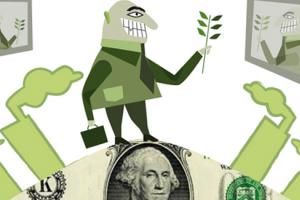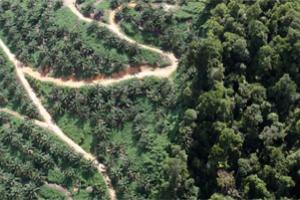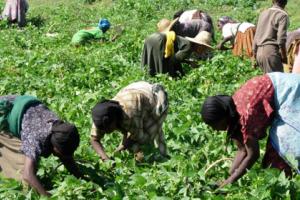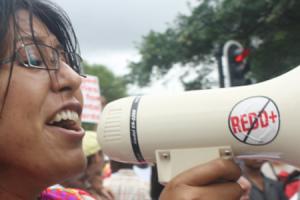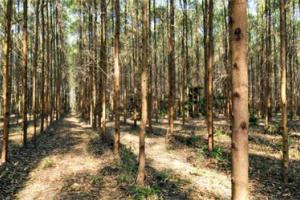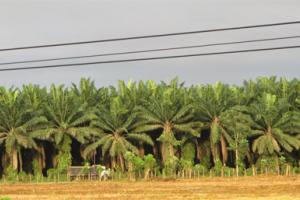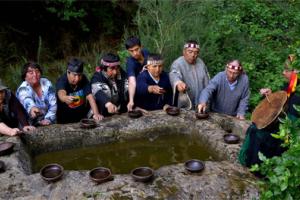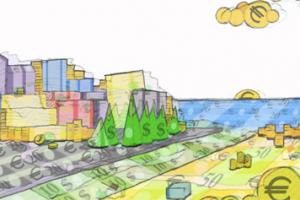Due to the UN climate negotiations -COP20- and the Peoples' Summit on Climate Change, held in Lima, Peru, in December 2014, over 100 organizations and social movements made a Call to Action to strongly and collectively reject REDD+ and the 'environmental services' - towards the COP21 in Paris, France, in December 2015.
The Green Economy
The Green Economy is a tactic used to “clean up” the image of corporations rather than address corporate capture and capitalism as the true drivers of deforestation. False solutions promoted under the Green Economy include certification, sustainable forest management, ecosystem services, REDD+, the bioeconomy, nature-based climate solutions, and zero net deforestation. Rather than stopping it, these “solutions” support corporate-driven destruction that is causing a deep social and ecological crisis.
Action alerts
18 April 2015
Bulletin articles
10 April 2015
For several years now the Food and Agriculture Organization of the United Nations (FAO) has celebrated the International Day of Forests on March 21. This year’s theme is: “Forests, Climate, Change.” But the changes we see that the FAO promotes only increase the problems of the peoples who depend on forests, such as the trend in Southern countries, like China, Malaysia, Brazil and Chile, to promote commercial plantations of genetically engineered trees.
Other information
10 April 2015
The Global Alliance for Climate-Smart Agriculture was launched on September 2014, at the UN Climate Summit in New York. This alliance is the outcome of years of determination by FAO and the World Bank to get the concept of “climate-smart agriculture” onto the international agenda, together with the ideological context and policies it implies.
Bulletin articles
10 April 2015
30 years ago, during FAO's World Forestry Congress in Mexico in June 1985, the Tropical Forestry Action Plan (TFAP) was adopted as the new international framework for forest-related action (1). In November of the same year, representatives of bilateral and multilateral donor agencies, supported by some international NGOs, also accepted the TFAP (later renamed into Tropical Forests Action Programme) as a framework for their bilateral and multilateral activities and funding related to tropical forests.
Other information
11 March 2015
The video by Radio Mundo Real on Financialization of Nature was produced in collaboration with the Biodiversity Alliance, Friends of the Earth Latin America and the Caribbean and the World Rainforest Movement. The video attempts to explain what financialization of nature is, what mechanisms it employs, what it does in the territories, its impacts and the resistance it generates.
Bulletin articles
11 March 2015
Bulletin articles
10 March 2015
The meaning of the term “safeguards” depends on who uses it and in what context. It may imply positive action in terms of human rights or the environment, or it may simply be a rhetorical flourish aimed at preventing losses of investments and profits. Nowadays there is much talk around the world about safeguards for the implementation of REDD+ (Reducing Emissions from Deforestation and Forest Degradation) projects, conservation, sustainable forest management and increasing forest carbon stocks. (1)
Other information
4 March 2015
What is nature worth? How much profit can it report? At a time when biodiversity is critically threatened, this documentary reveals how banks and private investors are increasingly converting natural resources into objects of financial speculation. “Nature, le nouvel eldorado de la finance” (“Banking Nature”) shines a spotlight on the mechanisms of a nascent system that could end up as a manifestation of global hypocrisy.
Bulletin articles
23 February 2015
Bulletin articles
23 February 2015
Bulletin articles
23 February 2015
The companies Forestal Mininco y Forestal Arauco account for the vast majority of tree plantation activities in Chile, with almost two million hectares of monoculture plantations of exotic tree species, mainly pine and eucalyptus. Despite the resistance, denunciations and harsh criticisms on the part of numerous Mapuche Indigenous organizations and communities, both companies have been certified with the FSC label through foreign consulting firms.

